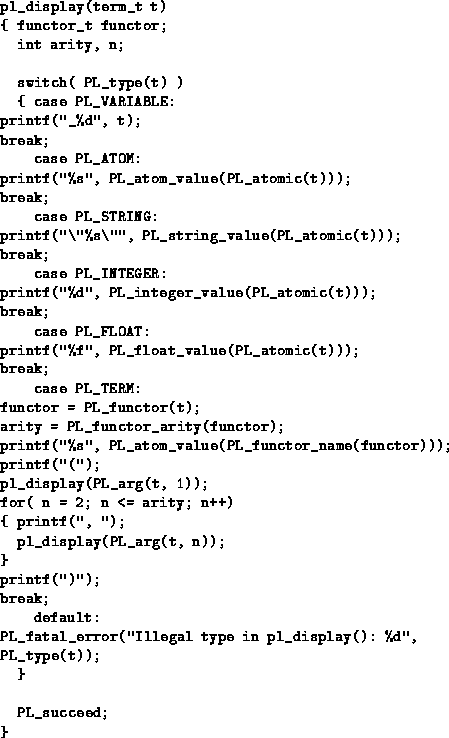


Next: Instantiating and Constructing
Up: The Foreign Include
Previous: Non-deterministic Foreign Predicates
Each argument of a foreign function (except for the control argument)
is of type term_t. To analyse a term one should first obtain the
type of the term. Primitive terms can then be transformed into
atomic data in internal Prolog representation. This atomic data can be
transformed into C-data types. Complex terms are analysed in terms on
their functor and arguments. The arguments themselves are terms,
allowing the same procedure to be repeated recursively.
- int
- PL_type( term_t)
Obtain the type of term, which should be a term returned by one
of the other interface predicates or passed as an argument. The
function returns the type of the Prolog term. The type identifiers are
listed below.

The functions PL_is_<type> allow form an alternative to
PL_type. The test ``PL_is_var(term)'' is equivalent to ``PL_type(term) ==
PL_VARIABLE'', but the first is considerably faster.
- int
- PL_is_var( term_t)
Returns non-zero if term is a variable.
- int
- PL_is_atom( term_t)
Returns non-zero if term is an atom.
- int
- PL_is_string( term_t)
Returns non-zero if term is a string.
- int
- PL_is_int( term_t)
Returns non-zero if term is an integer.
- int
- PL_is_float( term_t)
Returns non-zero if term is a float.
- int
- PL_is_term( term_t)
Returns non-zero if term is a compound term.
- atomic_t
- PL_atomic( term_t)
Return the atomic value of term in Prolog internal
representation. Term should be atomic (e.g. atom, integer,
float or string).
- long
- PL_integer_value( atomic_t)
Transforms an integer from Prolog internal representation into a C
long.
- double
- PL_float_value( atomic_t)
Transforms a float from Prolog internal representation into a C
double.
- char *
- PL_atom_value( atomic_t)
Transforms an atom from Prolog internal representation into a 0-terminated
C char *. The pointer points directly into the Prolog heap and can
assumed to be static. The contents of the character string however
should under NO circumstances be modified.
- char *
- PL_string_value( string)
Transform a string from Prolog internal representation into a C char *.
The pointer points directly into the Prolog data area. Unlike the
pointer returned by PL_atom_value() the C user should copy the value to
a private data area if its value should survive the current foreign
language call. Like PL_atom_value(), changing the contents of the
character string is NOT allowed.
- functor_t
- PL_functor( term_t)
term should be a complex term. The return value is a unique
identifier of the term's name and arity. The following example
demonstrates this:
pl_same_functor(term_t t1, term_t t2)
{ if ( !PL_is_term(t1) || !PL_is_term(t2) )
PL_fail;
if ( PL_functor(t1) == PL_functor(t2) )
PL_succeed;
PL_fail;
}
- atomic_t
- PL_functor_name( functor_t)
Return an atom representing the name of functor. To get the
functor name as char * of a term which is known to be compound:
#define functor_name(term) PL_atom_value(PL_functor_name(PL_functor(term)))
- int
- PL_functor_arity( functor_t)
Return a C integer representing the arity of functor.
- term
- PL_arg( term_t, int)
Return the int-th argument of term. Argument counting
starts at 1 and is valid up to and including the arity of term. No
checks on these boundaries are performed.
Figure  shows a definition of display/1 to
illustrate the described functions.
shows a definition of display/1 to
illustrate the described functions.

Figure: A Foreign definition of display/1



Next: Instantiating and Constructing
Up: The Foreign Include
Previous: Non-deterministic Foreign Predicates
Passani Luca
Tue Nov 14 08:58:33 MET 1995


![]() shows a definition of display/1 to
illustrate the described functions.
shows a definition of display/1 to
illustrate the described functions.
